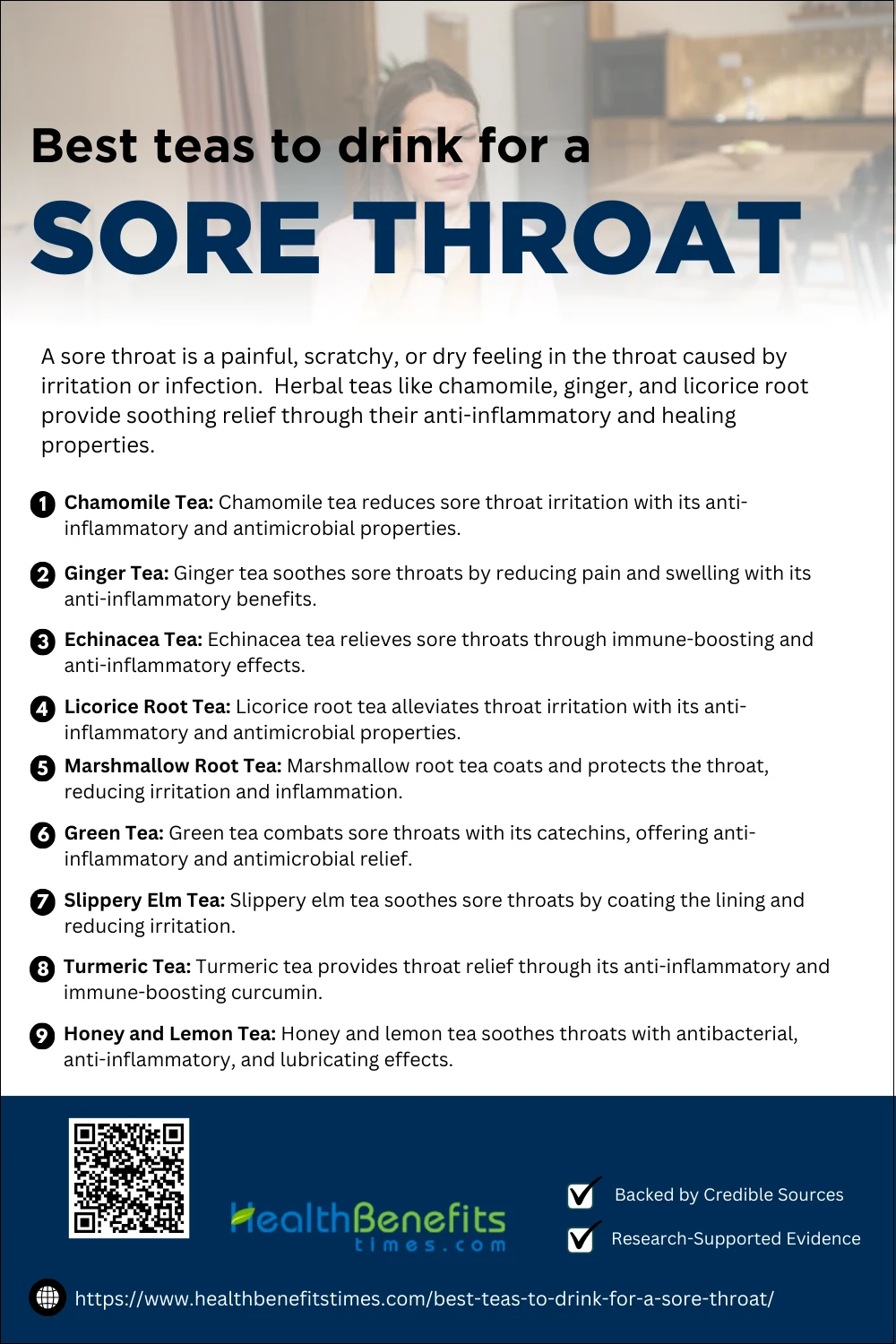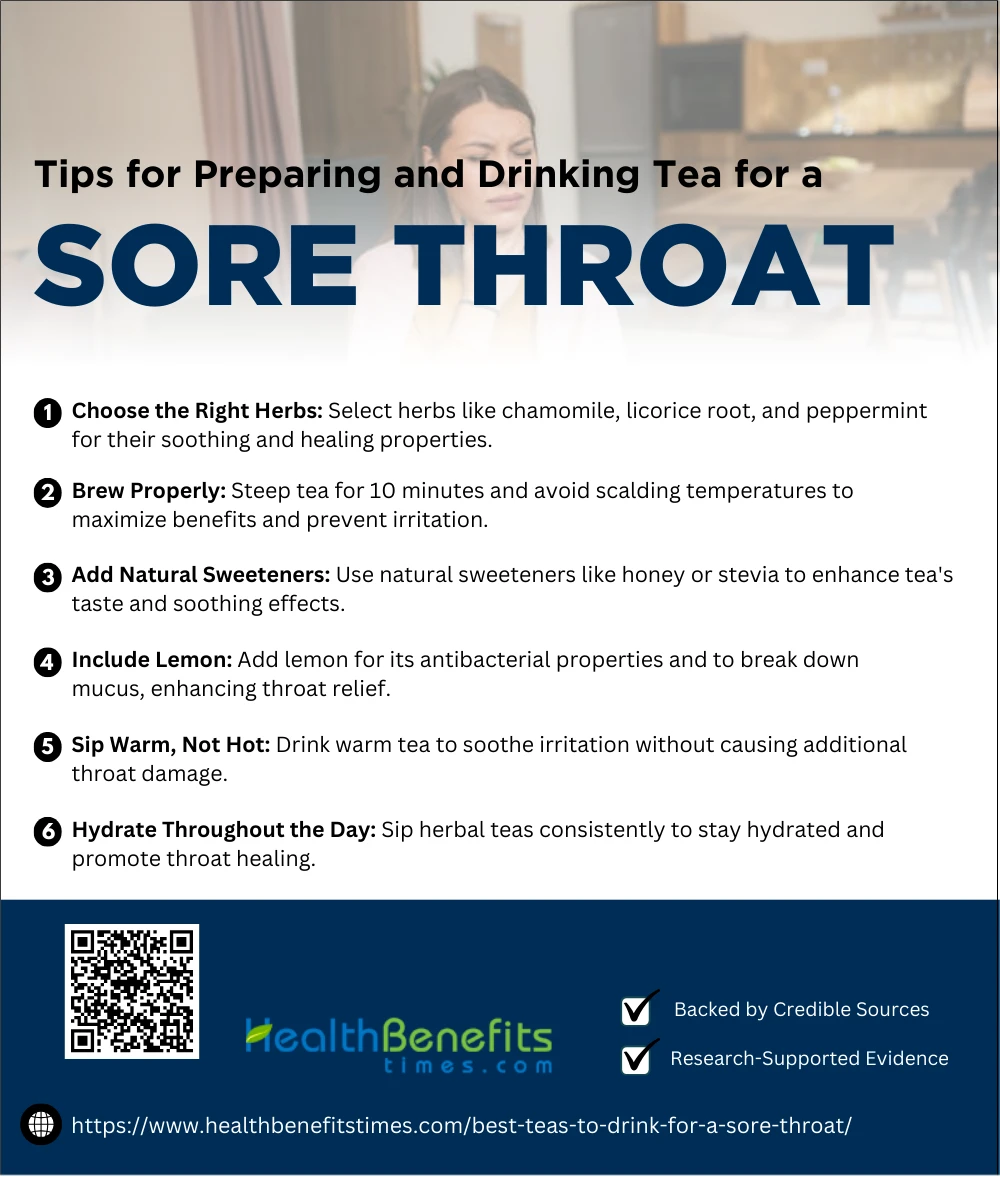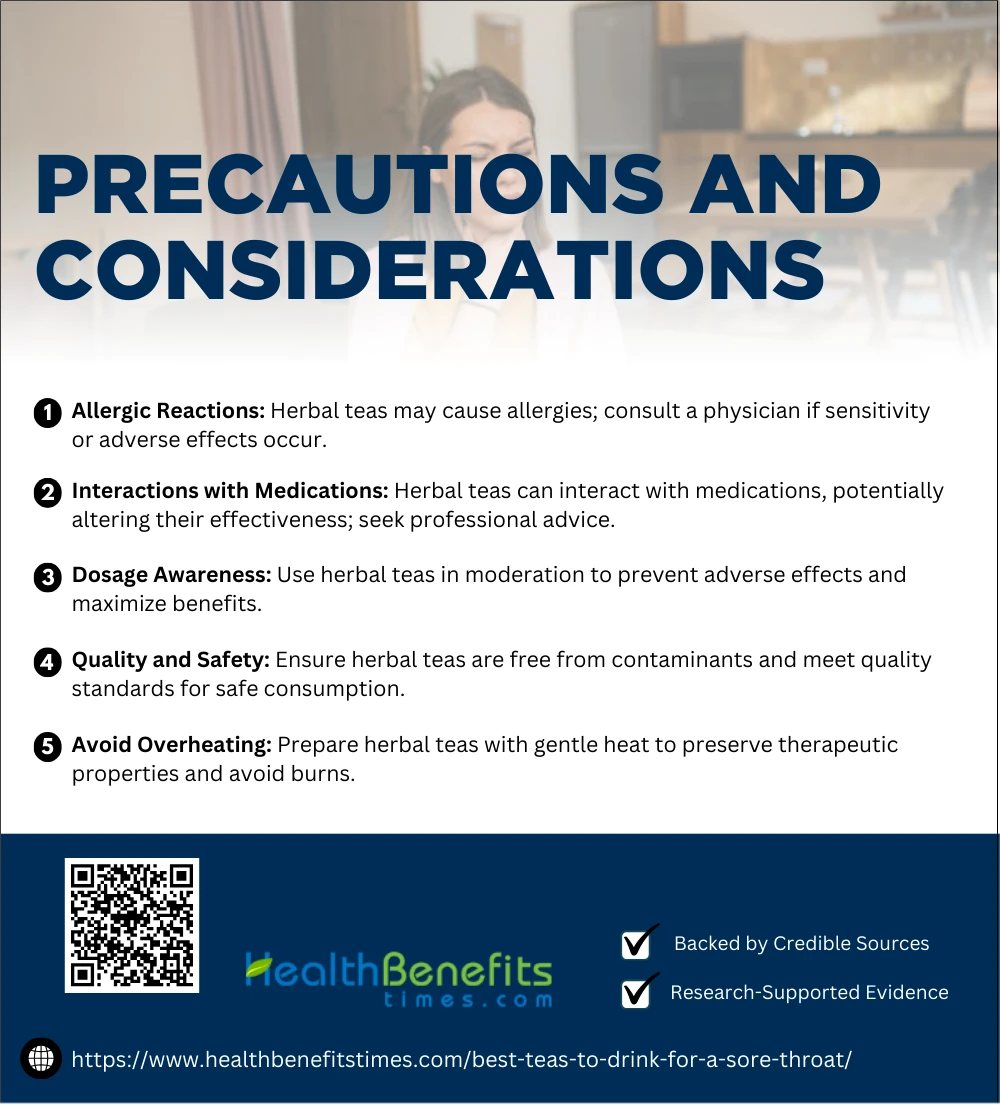- A sore throat is a painful, scratchy, or dry feeling in the throat caused by irritation or infection.
- Herbal teas like chamomile, ginger, and licorice root provide soothing relief through their anti-inflammatory and healing properties.
- Adding honey or lemon enhances the benefits, making these teas an effective and natural remedy for throat discomfort.
 A sore throat, medically known as pharyngitis, is a common condition characterized by pain, irritation, or scratchiness of the throat, often caused by infections or environmental factors (1).
A sore throat, medically known as pharyngitis, is a common condition characterized by pain, irritation, or scratchiness of the throat, often caused by infections or environmental factors (1).
Herbal teas are widely recognized as an effective natural remedy for soothing sore throat symptoms due to their anti-inflammatory and antimicrobial properties. Chamomile tea, with its antioxidant and anti-inflammatory properties, helps reduce throat discomfort (2). Sage tea, often combined with saltwater gargling, has been a traditional remedy to combat throat infections (3).
Research also highlights the benefits of herbal infusions like Echinacea and Throat Coat tea, which significantly reduce pain and improve comfort in patients with pharyngitis (4). Additionally, honey lemon tea offers both antimicrobial benefits and soothing relief for irritated throats (5).
For those seeking an evidence-backed, soothing remedy, integrating herbal teas such as green tea, licorice tea, chamomile, sage, or specialty teas like Throat Coat into daily routines offers not just relief but added health benefits.
How Tea Can Help with a Sore Throat
Drinking tea can provide significant relief for sore throats due to its various soothing and therapeutic properties. Herbal teas, such as those discussed in the 6, contain bioactive compounds that reduce throat inflammation. Green tea, rich in natural antimicrobial agents, has been explored as a therapy for sore throats, offering both soothing effects and support for immune health, as described in a study on 7. Additionally, peppermint tea has demonstrated its ability to alleviate throat irritation, as detailed in a 8. Research also highlights that echinacea herbal teas can reduce the severity of upper respiratory symptoms, including sore throats (9). Similarly, thyme herbal tea is noted for its benefits in soothing coughs and throat irritation (10). A study on 11 confirms their immune-modulating effects, which further help in combating sore throats. Lastly, the health benefits of herbal teas as a preventive and soothing measure for respiratory issues are comprehensively discussed in the 12.
Best teas to drink for a sore throat
Soothe your sore throat naturally with these comforting teas, offering relief through anti-inflammatory, antimicrobial, and soothing properties.
 1. Chamomile Tea
1. Chamomile Tea
Chamomile tea is widely regarded for its therapeutic properties, particularly in soothing sore throats. Its anti-inflammatory and antimicrobial effects help reduce throat irritation and discomfort, as supported by 13. Chamomile’s role in boosting local immunity is evident in studies showing its effectiveness in reducing symptoms of sore throat when used in treatments such as steam inhalation with chamomile oil (14). Additionally, research has demonstrated that consuming chamomile tea postoperatively can minimize sore throat occurrence (15). Chamomile tea’s lubricating properties also help reduce throat irritation during procedures like intubation (16). Its effectiveness in treating cold symptoms, including sore throats, is highlighted in herbal tea reviews (6). Chamomile is also recognized in traditional medicine as a potent remedy for throat and respiratory issues (17). Lastly, its broad adoption as a daily health beverage showcases its ability to alleviate common throat-related ailments (18).
2. Ginger Tea
Ginger tea is a powerful natural remedy for sore throats due to its anti-inflammatory and antimicrobial properties. Studies highlight its ability to reduce throat pain and swelling, making it an effective treatment for respiratory infections (19). The combination of ginger with honey provides added relief, as it soothes irritation and coats the throat (20). In traditional medicine, ginger tea is valued for its role in calming infections and strengthening immunity (21). The essential oils in ginger act against congestion, coughs, and throat irritation, providing comprehensive respiratory relief (22). Additionally, it is known to break up mucus and reduce coughing, enhancing comfort during colds (23). Research further confirms its efficacy against rhinovirus, emphasizing its preventive benefits for common colds (24). The role of ginger tea in traditional medicine is extensively discussed for its ability to ease sore throat symptoms and promote overall well-being (25).
3. Echinacea Tea
Echinacea tea is a popular remedy for soothing sore throats due to its anti-inflammatory and immune-boosting properties. Traditionally, Native Americans used Echinacea angustifolia for sore throat relief (26). It is a common component in herbal remedies (27) and offers significant relief for viral-induced sore throats (28). Echinacea’s role in managing respiratory discomfort extends to both acute and chronic cases (29). Research highlights its application in mucosal immunity enhancement, especially for pharyngitis (30).
4. Licorice Root Tea
Licorice root tea has long been recognized for its therapeutic effects on sore throat relief. Its anti-inflammatory and antimicrobial properties are pivotal in reducing throat irritation and combating infections like streptococcal pharyngitis (31). Research on its bioactive compounds, including glycyrrhizin, underscores its potential in soothing respiratory discomfort (32). Licorice’s role in herbal tea blends like Throat Coat has further validated its benefits (33). Studies also suggest its applications extend to chronic pharyngitis management (34). Its traditional use, coupled with modern scientific backing, supports its widespread recommendation (35). Moreover, historical and immunological benefits of heat-processed licorice highlight its versatility (36).
5. Marshmallow Root Tea
Marshmallow root tea is a natural remedy known for its soothing effects on sore throats due to its mucilaginous properties, which coat and protect the throat. Studies highlight its effectiveness in reducing throat irritation and inflammation (37). The tea’s ability to form a protective layer makes it effective against dry coughs and sore throats (38). It is also an ingredient in many herbal remedies targeting respiratory discomfort (39). Traditional uses have been validated in modern formulations for respiratory health (40). Herbal combinations, including marshmallow root, have shown effectiveness in treating coughs and throat pain (41). Research also points to its role in soothing inflamed tissues (42) and improving symptoms of pharyngitis (43).
6. Green Tea
Green tea has emerged as a popular remedy for soothing sore throats due to its anti-inflammatory and antimicrobial properties. Its catechins have shown the ability to inhibit bacterial growth associated with pharyngitis (31). Research confirms that green tea catechins can prevent throat infections, including influenza-related discomfort (44). Green tea gargling has also been shown to reduce hoarseness and post-operative sore throat (45). Its allergy-relieving properties further enhance its role as a remedy for throat irritation (46). Lastly, its traditional use in preventing bacterial infections solidifies its efficacy in oral health and sore throat prevention (47).
7. Slippery Elm Tea
Slippery elm tea is an effective natural remedy for soothing sore throats due to its mucilage content, which coats and protects the throat lining. Research highlights its ability to reduce irritation and promote healing (48). Studies suggest slippery elm’s bark can alleviate throat discomfort and respiratory conditions (38). Its inclusion in lozenges and teas has proven beneficial for managing pharyngitis symptoms (49). Traditional uses extend to vocal health, particularly for singers (50). Its application for cough and flu management is well-documented (51). Modern studies emphasize its role in soothing inflamed tissues and promoting mucus clearance (52). Furthermore, it has been recognized as safe and effective for respiratory support (53).
8. Turmeric Tea
Turmeric tea is a potent natural remedy for sore throat relief due to its anti-inflammatory and antimicrobial properties. Curcumin, its active compound, has shown effectiveness in alleviating throat irritation and infections (7). Traditionally, turmeric has been used in remedies to combat cough and congestion (54). Studies confirm its efficacy in viral respiratory conditions and as an immune booster (55). Its incorporation in herbal lozenges enhances throat protection (56). Warm turmeric milk is also a well-known traditional remedy (57). Additionally, turmeric tea combines well with honey and lemon, offering additional soothing effects (58). Its long-standing medicinal use further supports its credibility as a remedy for throat discomfort (59).
9. Honey and Lemon Tea (Bonus)
Honey and lemon tea is a popular natural remedy for soothing sore throats due to its antibacterial, anti-inflammatory, and soothing properties. Studies confirm its effectiveness in reducing post-operative throat pain and cough when gargled or consumed warm (60). The combination of honey and lemon enhances throat lubrication, offering relief from irritation (58). Its antiviral properties are also notable in combating throat infections (61). Lemon contributes vitamin C, enhancing immunity (62). Research shows honey alone is widely used for acute respiratory issues (63). Its soothing effects on throat irritation have been noted in herbal cough lozenge formulations (64). Honey and lemon’s combined use in teas enhances their therapeutic effects (65).
Tips for Preparing and Drinking Tea for a Sore Throat
Enhance the soothing effects of tea for a sore throat with these preparation tips, ensuring maximum comfort and effective relief.
 1. Choose the Right Herbs
1. Choose the Right Herbs
Choosing the right herbs for tea is essential for soothing a sore throat. Slippery elm tea forms a protective coating, relieving irritation effectively (66). Licorice root tea’s antiviral properties combat infections (67). Chamomile tea reduces inflammation, promoting faster healing (68). Sage tea, with its antibacterial traits, eases throat pain (69). Finally, peppermint tea offers a soothing menthol effect, reducing irritation (70).
2. Brew Properly
To prepare tea for soothing a sore throat, use herbal teas like chamomile or echinacea. These teas reduce throat inflammation and discomfort. Steeping tea for 10 minutes maximizes health benefits. Avoid scalding hot tea as it may worsen irritation. Adding honey enhances antibacterial properties (71). Cold-brewed teas may provide gentler relief (72).
3. Add Natural Sweeteners
Adding natural sweeteners to tea can soothe a sore throat effectively. Ingredients like honey are known to suppress coughing and reduce irritation due to their antibacterial properties (64). Monk fruit, widely used in herbal remedies, offers a natural, low-calorie alternative (73). Stevia, a plant-based sweetener, enhances taste while providing health benefits (74). Thyme tea, enriched with honey, alleviates throat discomfort (75). Herbal teas sweetened with stevia reduce inflammation and provide relief (76).
4. Include Lemon
Adding lemon to tea offers notable benefits for soothing a sore throat. Lemon’s natural acidity helps break down mucus and provides antibacterial properties (77). Warm lemon-infused water with honey can ease throat irritation (58). Herbal teas with lemon promote hydration and relieve throat dryness (78). Decoctions of mint and lemon are effective against respiratory symptoms (55). Additionally, gargling with lemon water reduces post-surgical throat discomfort (60).
5. Sip Warm, Not Hot
Sipping warm, not hot, tea is vital for soothing a sore throat without causing irritation. Herbal teas served warm are effective for clearing mucus and reducing throat dryness (79). Warm liquids, like sage tea, also relieve inflammation (80). Research confirms warm teas reduce throat discomfort better than cold alternatives (81). Consistent warmth aids recovery by soothing irritation (78).
6. Hydrate throughout the Day
Staying hydrated by sipping tea throughout the day can significantly alleviate a sore throat. Herbal teas, like thyme tea, are particularly effective for hydration and soothing irritation (10). Warm fluids help reduce throat dryness and swelling, facilitating recovery (82). Blackberry leaf tea offers additional benefits for hydration and throat relief (Mars). Drinking teas regularly ensures consistent hydration, promoting healing (83). Adequate hydration through tea improves overall cellular health.
Precautions and Considerations
Herbal teas can soothe a sore throat, but consider potential allergens, side effects, and health conditions before choosing the right tea.
 1. Allergic Reactions
1. Allergic Reactions
Allergic reactions to herbal teas can include difficulty breathing, throat irritation, or skin reactions. Green tea, for instance, may cause anaphylaxis in sensitive individuals. Herbal teas containing daisy family plants often trigger allergies (6). Components in echinacea may also cause adverse reactions (9). Similarly, licorice tea could lead to breathing difficulties (25). Always consult a physician before consumption (46).
2. Interactions with Medications
Certain herbal teas may interact with medications, altering their efficacy. Licorice, for instance, can influence corticosteroid metabolism (84). Chamomile may enhance anticoagulant effects, increasing bleeding risk (85). Concurrent green tea usage might reduce the efficacy of beta-blockers (86). Drug-herb interactions in echinacea could affect liver enzyme pathways (87). Always consult professionals when mixing herbal teas with medications (88).
3. Dosage Awareness
Proper dosage of herbal teas is critical to prevent adverse effects and ensure efficacy. Overconsumption of teas like Lonicera japonica may pose risks (86). Controlled amounts of echinacea tea are effective for sore throat relief (9). Excessive vitamin-rich herbal teas can lead to toxicity (89). Awareness of dosage-benefit relationships is key (90).
4. Quality and Safety
Ensuring quality and safety in herbal teas is crucial for effectiveness. Variability in medicinal content, such as in Lonicera japonica, highlights the need for stringent quality control (86). Contaminants, like fluoride, underscore safety concerns (6). Quality assurance ensures bioactive consistency (90). Regular safety checks can prevent toxic effects (31).
5. Avoid Overheating
Avoiding overheating herbal teas ensures their therapeutic properties remain intact and prevents burns. Overheated teas can reduce the efficacy of compounds like marshmallow and licorice. Excessive heat may damage bioactive elements in throat-soothing blends. Controlled preparation retains healing attributes. Use gentle heat to preserve essential properties. Regular monitoring prevents accidental overheating (91).
Conclusion
In conclusion, the right tea can be a comforting and effective remedy for a sore throat, offering relief through hydration, warmth, and healing properties. From chamomile’s soothing effects to ginger’s anti-inflammatory benefits and licorice root’s protective coating, these teas cater to various needs while promoting overall wellness. Adding honey or lemon can enhance their effectiveness, but it’s essential to choose teas that suit your individual health conditions. By incorporating these natural remedies, you can ease discomfort and support your body’s recovery. Always consult a healthcare professional if symptoms persist or worsen.
References:
- Pelucchi et al., 2012
- Mendicino, n.d.
- Castro et al., 1995
- Brinckmann & Sigwart, 2003
- Titinchi et al., 2010
- Hosen & Madhu, “Health Benefits of Herbal Tea: A Review.“
- Niculescu & Grumezescu, “Natural compounds for preventing ear, nose, and throat-related oral infections.“
- McKay & Blumberg, “A review of the bioactivity and potential health benefits of peppermint tea (Mentha piperita L.).”
- Lindenmuth & Lindenmuth, “Echinacea compound herbal tea preparation for upper respiratory and flu symptoms.”
- Funnell, “Thyme Herbal Tea for cough.“
- Schütz et al., “Immune-modulating efficacy of polyphenol-rich beverages.”
- Kamiloglu et al., “Health perspectives on herbal tea infusions.”
- McKay, D.L., & Blumberg, J.B. (2006). “A review of the bioactivity and potential health benefits of chamomile tea.”
- Reva, T., et al. (2020). “Influence of chamomile oil on local immunity in sore throat.”
- Srivastava, J.K., & Gupta, S. (2009). “Health-promoting benefits of chamomile in the elderly population.“
- Srivastava, J.K., & Shankar, E. (2010). “Chamomile: A herbal medicine of the past with a bright future.“
- Chauhan, E.S., & Jaya, A. (2017). “Chamomile: An ancient aromatic plant.”
- Kolanos, R., & Stice, S.A. (2021). “German chamomile.“
- Shahrajabian, M.H., et al. (2019). “Clinical aspects and health benefits of ginger.”
- Sharma, S. (2021). “Role of Ginger and its Components in Common Cold.”
- Komiljonova, O. (2024). “The Use of Ginger for Medicinal Diseases.“
- Bhowmik, D., et al. (2010). “Zingiber officinale: Traditional and Therapeutic Uses.”
- Hadjipateras, E. (2021). “Health Benefits of Ginger Tea.”
- Bhatt, N., et al. (2013). “Ginger: A Functional Herb.”
- Ravikumar, C. (2014). “Review on Herbal Teas.”
- Gunning K. Echinacea in the treatment and prevention of upper respiratory tract infections. West Journal of Medicine, 1999.
- Mihail F. Herbal, traditional, and alternative remedies. Springer, 2009.
- Zygmunt AE et al. The role of Echinacea in cold prevention and treatment. Quaestiones Scientiarum, 2024.
- Aucoin M et al. Echinacea spp. in respiratory tract infections. Journal of Clinical Immunology, 2020.
- Hall H et al. Echinacea purpurea and mucosal immunity. International Journal of Phytotherapy, 2007.
- Wijesundara NM, Rupasinghe HPV. Herbal Tea for the Management of Pharyngitis. Biomedicines, 2019.
- Ding Y et al. Licorice: Resources, applications in ancient and modern times. Journal of Ethnopharmacology, 2022.
- Shaughnessy AF. Is Herbal Tea Effective for Pain of Acute Pharyngitis?. American Family Physician, 2003.
- Li C et al. Systematic review of herbal tea in chronic pharyngitis therapy. Journal of Traditional Chinese Medicine, 2019.
- AlDehlawi H, Jazzar A. The Power of Licorice (Radix glycyrrhizae). Healthcare, 2023.
- Ota M, Makino T. History and immunostimulatory effects of heat-processed licorice. Journal of Traditional and Complementary Medicine, 2022.
- Tripathi P, Bahuguna Y. A review on herbal gargles. World Journal of Pharmaceutical Research, 2022.
- Garg R, Dobhal K, Singh A. Utilization of Medicinal Herbal Plants in Respiratory Conditions. IntechOpen, 2024.
- Vaja PN, Borkhataria CH, Popaniya HS. Systematic Review on Medicinal Plant Species to Treat Pharyngitis. Asian Journal of Pharmacy and Technology, 2024.
- Meserole L, Yarnell E. Flu season: Herbal tonics from nature’s pharmacy. Alternative and Complementary Therapies, 1996.
- Pecoraro L et al. Well-Established Use of Vegetal Extracts in Cough Management. Children, 2024.
- Mendicino S. Best Tea for Sore Throat Pain. Botanical Institute, 2021.
- Popovych V et al. Efficacy of Herbal Extracts in Pharyngitis Treatment. Springer, 2021.
- Matsumoto K et al. Green tea catechins and influenza prevention. BMC Complementary and Alternative Medicine, 2011.
- Jafari H et al. Green tea gargle solution’s effect on post-surgical sore throat. Journal of Research in Medical Sciences, 2016.
- Maeda-Yamamoto M et al. Anti-allergic effects of green tea. Cytotechnology, 2007.
- Moghbel A et al. Green tea and bacterial infection prevention. Iranian Journal of Clinical Infectious Diseases, 2011.
- Watts CR, Rousseau B. Slippery elm for laryngeal irritation. Natural Medicines Comprehensive Database, 2012.
- Wijesundara NM, Sekhon-Loodu S, Rupasinghe HPV. Phytochemical-rich medicinal plant extracts. PeerJ, 2017.
- Meenan K et al. Slippery elm and vocal remedies. Vocal Remedies, 2016.
- Gould K. Treating colds and flu with herbal solutions. Autism File, n.d.
- Sadowski K. Fight mucus with slippery elm. Earth to Kathy, n.d.
- Edwards SE, Rocha I. Slippery elm as a botanical treatment. ResearchGate, 2015.
- Bagde K et al. Therapeutic effects of turmeric. International Journal of Research in Pharmaceutical Sciences, 2020.
- Karakuş MM et al. Herbal preparations for respiratory conditions. NIH, 2023.
- Ratre G et al. Herbal lozenges for sore throat. Mattioli 1885, 1885.
- Over W, Medicines TC. Turmeric milk for throat relief. Wellbeing Nutrition, n.d.
- Sultana S et al. Turmeric tea and cough suppression. International Journal of Pharmacy and Science, 2016.
- Yardley K. The Good Living Guide to Herbal Remedies. 2016.
- Rajai N, Aryaeefar M, Pishgooie AH. Effect of gargling with Honey and Lemon Water. Journal of Mazandaran University of Medical Sciences, 2022.
- Titinchi F et al. Honey and Lemon Tea vs. Strepsils. ResearchGate, 2010.
- Kumar V. The Secret Benefits of Lemon and Honey. Secret Guides, 2007.
- Ahmed O et al. Honey for acute respiratory infections. ResearchGate, 2023.
- Suresh JV et al. Herbal Cough Lozenges. Academia, 2024.
- Sharma R. Improve your Health! With Honey. 2005.
- (n.d.). Best Tea for a Sore Throat.
- (n.d.). 10 Best Teas to Soothe Your Sore Throat.
- Medical News Today. (n.d.). Natural Remedies for a Sore Throat.
- Mayo Clinic. (n.d.). Sore Throat – Diagnosis & Treatment.
- University Health Service. (n.d.). Sore Throat: Remedies and Tips.
- Zak, V. (2009). 20,000 secrets of tea.
- Kirk, M. (2019). Tea-Vitalize: Cold-Brew Teas.
- Kinghora, A.D., et al. Sweetening Agents of Plant Origin.
- Arumugam, B., et al. Stevia as a Natural Sweetener: A Review.
- Kailey, R., et al. Herbal Candies: A Potential Source of Health Benefits.
- Verma, A., et al. Quality Attributes of Therapeutic Tea Sweetened with Stevia.
- Titinchi, F., et al. Treatment of Postoperative Sore Throat.
- Davis, S. Soothing a Sore Throat.
- Li, D., et al. Ethnobotanical Survey of Herbal Tea Plants.
- Castro, M., et al. Sore Throats.
- Staden, M. Summer Sore Throats.
- Gupta, A., Sheikh, K. Flu Remedies.
- Louis, T. Did You Know?.
- Karimi, H., et al. Effect of Licorice and Green Tea Gargle.
- Izzo, A.A. Interactions Between Herbs and Conventional Drugs.
- Li, C., et al. Systematic Review of Herbal Tea.
- Ulbricht, C., et al. Herb-Drug Interactions: A Systematic Review.
- Miller, L.G. Herbal Medicinals: Clinical Considerations.
- Akgöl, J., et al. Vitamin Toxicity in Herbal Teas.
- Kamiloglu, S., et al. Health Perspectives on Herbal Teas
- Lohn, C. Women’s Medical Knowledge and Respiratory Illnesses.

